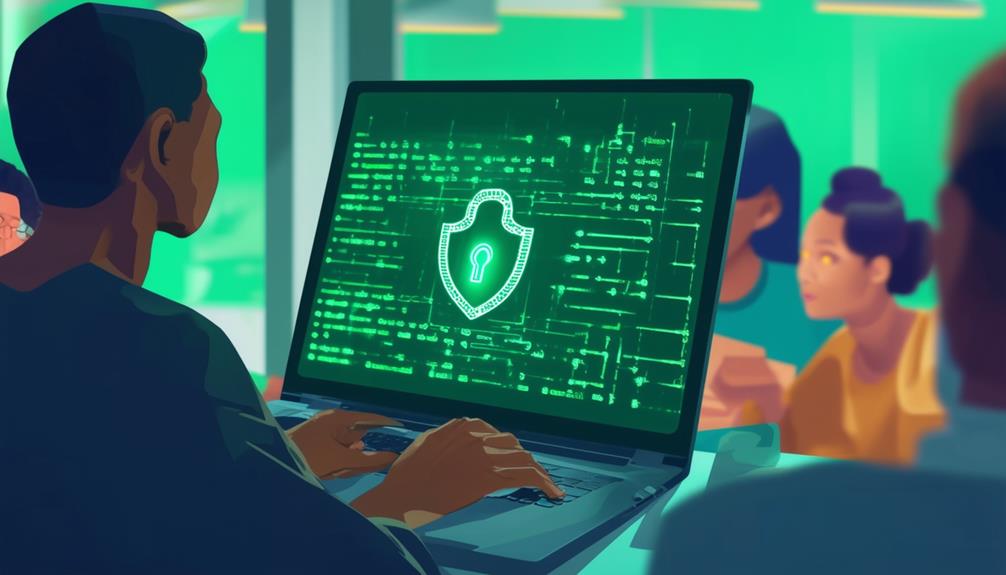While iPhones boast robust security features like Face ID, Touch ID, and regular software updates, they are not impervious to hacking. Hackers target vulnerabilities in iOS and third-party apps, making caution essential. Signs of hacking include unusual behaviors like fast battery drainage or unauthorized access. Respond by changing passwords, removing suspicious apps, and updating software. Prevention is key – use strong passwords, two-factor authentication, and download from trusted sources. For enhanced security, consider using a VPN on public Wi-Fi networks. While iPhones offer security measures, understanding potential risks and taking proactive steps are pivotal for safeguarding your device.
Key Takeaways
- iPhones are not immune to hacking attempts.
- Strong security features like Face ID and regular updates enhance protection.
- Hackers target iOS vulnerabilities and third-party apps.
- Phishing attempts can compromise iPhone security.
- Utilize built-in security measures, strong passwords, and caution for enhanced safety.
Iphone Security Features Overview
In examining the security features of iPhones, it becomes evident that Apple has incorporated advanced measures to safeguard user data and devices from potential threats. With features like Face ID, Touch ID, and strong passcodes, iPhones offer robust protection for user privacy and data security.
Additionally, Apple's regular release of security patches and updates guarantees that vulnerabilities are promptly addressed, enhancing overall device protection. Two-factor authentication adds an extra layer of security, preventing unauthorized access to accounts even if passwords are compromised.
Moreover, the stringent control over apps in the App Store aids in preventing the download of malicious software onto iPhones, reducing the risk of cyber threats. Within the iOS system, built-in security measures further protect against various threats such as malware and phishing attacks, ensuring a secure user experience.
Myths About Iphone Hacking

Contrary to popular misconceptions, iPhones are not impervious to hacking attempts and malware infiltration. Despite the robust security measures implemented by Apple, iPhones can still fall victim to malicious software due to various factors.
One prevalent myth about iPhone hacking is that only jailbroken devices are at risk, but in reality, even non-jailbroken iPhones can be compromised. Hackers target vulnerabilities in the iOS operating system and third-party apps to gain unauthorized access to personal data and compromise online privacy.
Users should be wary of phishing attempts that trick them into revealing sensitive information or clicking on suspicious links that can lead to malware installation. While Apple continuously strengthens its security protocols, staying cautious and avoiding unfamiliar apps remain vital in safeguarding iPhones against potential breaches.
It is essential to debunk these myths about iPhone hacking to promote a better understanding of the risks and encourage proactive measures to enhance device security.
Signs of Iphone Hacking

Common indicators of a potential iPhone hacking incident include unexplained fast battery drainage and overheating. If you find yourself locked out of your Apple ID or notice unauthorized access, these could be signs of a hacked iPhone.
Another red flag is the sudden appearance of unfamiliar apps on your home screen without your knowledge. Additionally, if your contacts start receiving strange messages or emails purportedly from you that you didn't send, it might indicate a compromised device.
Additionally, be cautious if you observe decreased performance, increased data usage, or unusual activities on your iPhone, as these could be further signs of a hacked device. It is essential to stay vigilant and promptly address any of these signs to safeguard the security of your iPhone and prevent potential data breaches.
Regularly monitoring your device for these signs is vital to maintain iPhone security and protect your personal information.
Dealing With a Hacked Iphone

Detecting signs of a potential iPhone hacking incident prompts the need to promptly address the security breach by implementing effective measures for dealing with a hacked iPhone. If you suspect your iPhone has been hacked, look out for unusual activities like receiving strange phone calls, the presence of apps you don't recognize, or a sudden drain in battery life.
In such cases, act swiftly by changing all your passwords, removing any unfamiliar apps, and updating your device and apps regularly to prevent further unauthorized access. Activate the Find My iPhone feature to locate your phone and secure it.
If you suspect a hacker has gained access, consider enhancing your online security with a reliable VPN service. Additionally, be cautious of phishing scams that could compromise your iPhone's security.
Taking these steps will help you remove a hacker from your device and safeguard it against future hacking attempts.
Protecting Your Iphone

Enhancing the security of your iPhone involves utilizing Apple's built-in features and following recommended practices to protect your device from potential hacking threats. Apple provides the latest security updates and patches to guarantee iPhones are generally secure. It is essential to regularly update your iPhone settings to access the most recent security features.
Using strong passwords and enabling two-factor authentication adds layers of security to safeguard your iPhone against unauthorized access. Additionally, avoid jailbreaking your device and only download apps from trusted sources to minimize the risk of security breaches.
Utilizing a VPN when connecting to public Wi-Fi networks can also boost your iPhone's security. Apple's security features like biometric authentication through Face ID and Touch ID, along with enabling Find My iPhone and setting unique passcodes, further strengthen the protection of your device against potential hackers.
Common Iphone Hacking Methods

Common iPhone hacking methods include:
- Clicking on malicious links that can lead to malware installation
- Downloading infected apps, especially on jailbroken devices
- Weak passwords susceptible to brute force attacks
- Hackers targeting specific iOS versions with known vulnerabilities
- The risk of hacking when using unsecured public Wi-Fi networks
These techniques highlight the importance of staying vigilant and utilizing iPhone security features to protect against potential cyber threats.
Common Hacking Techniques
Hackers employ various methods to target iPhones and compromise their security, including exploiting vulnerabilities in iOS versions and tricking users into downloading malware-laden apps. Clicking on malicious links can lead to malware installation, while downloading infected apps, especially on jailbroken devices, poses a significant risk.
Weak passwords on iPhones are vulnerable to brute force attacks, where hackers systematically try different combinations to gain access. Additionally, hackers may exploit specific iOS vulnerabilities to infiltrate iPhones and compromise sensitive data. Connecting to unsecured public Wi-Fi networks also exposes iPhones to potential hacking attempts, as cybercriminals can intercept data transmitted over these networks.
These common hacking techniques highlight the importance of robust iPhone security measures to mitigate risks and protect against unauthorized access to personal information. It is vital for iPhone users to stay vigilant and implement best practices to enhance their devices' security against evolving cyber threats.
Iphone Security Features
In light of the prevalent iPhone hacking methods discussed, an exploration of the security features integrated into iPhones becomes essential to bolster defenses against potential cyber threats.
Apple's iOS security is reinforced by advanced technologies such as Touch ID and Face ID, offering robust biometric authentication to safeguard user data.
Regular iOS updates from Apple are important as they address security vulnerabilities, enhancing the overall security of your iPhone.
It is essential to refrain from jailbreaking your iPhone, as this practice bypasses Apple's security measures, leaving the device more susceptible to hacking attempts.
Utilizing multi-factor authentication and being cautious while downloading apps from the Apple Store are additional steps to fortify the security of your iPhone.
Preventing Iphone Hacks

Implementing strong security measures is crucial in preventing iPhone hacks and safeguarding your personal information. iPhones are generally more secure than Android devices, but proactive steps are still necessary.
To protect your device, use unique passwords and enable two-factor authentication to prevent unauthorized access. Regularly update to the latest iOS version and keep your apps current to patch security flaws.
When connecting to public Wi-Fi networks, exercise caution as hackers can intercept your data; consider using reputable antivirus software for added protection against malware.
Avoid jailbreaking your iPhone, as it can expose vulnerabilities. By following these precautions, you can greatly reduce the risk of falling victim to iPhone hacks and guarantee the safety of your online information.
Responding to Iphone Hacks

When faced with an iPhone hack, swift and decisive action is imperative to mitigate potential damages and secure your personal data.
Change all passwords for critical accounts immediately to prevent identity theft and secure your online accounts.
Remove any unfamiliar or suspicious apps that may have been installed without your consent, as they could be used for malicious purposes like phishing emails.
Regularly update your iPhone and all installed apps to patch security vulnerabilities that hackers may exploit.
Activate the Find My iPhone feature to track and secure your device in case of unauthorized access.
Seek assistance from Apple support to address the hack and prevent further breaches.
Utilize a reliable VPN for enhanced online security and privacy protection after experiencing an iPhone hack.
Frequently Asked Questions
Can an Iphone Be Hacked Easily?
An iPhone can be hacked through various methods, making it vulnerable to cyber threats. Factors like weak passwords, malicious links, and targeted iOS vulnerabilities increase the risk. Vigilance, regular updates, and security measures are essential for protection.
Can I Tell if My Iphone Has Been Hacked?
Revealing the intricate web of digital compromise, recognizing the subtle signs of intrusion on your iPhone is paramount. Beware of unusual activities, unfamiliar apps, and abnormal data usage to discern potential hacking attempts.
Are Iphones Really Secure?
iPhones are equipped with advanced security features such as hardware-based encryption and App Store control. While vulnerabilities have been exploited in the past, regular updates and patches from Apple help enhance iPhone security against emerging threats.
How Do I Secure My Iphone?
To secure your iPhone, enable biometric security like Face ID or Touch ID, set a strong passcode, activate two-factor authentication, avoid jailbreaking, and regularly update iOS. These measures enhance protection against potential security breaches and unauthorized access.
Conclusion
To sum up, while iPhones have advanced security features in place, they are not completely immune to hacking. It is essential for users to be vigilant and take necessary precautions to protect their devices.
Remember, even the most secure systems can be breached. Stay informed, stay cautious, and stay safe in the digital world.









